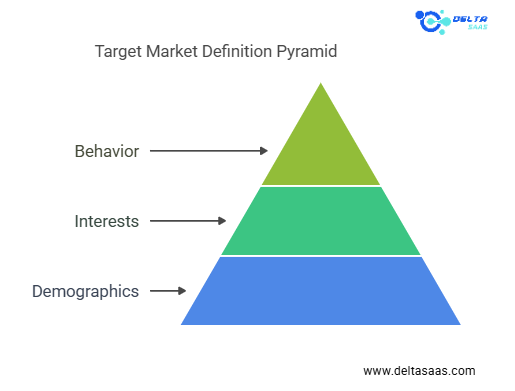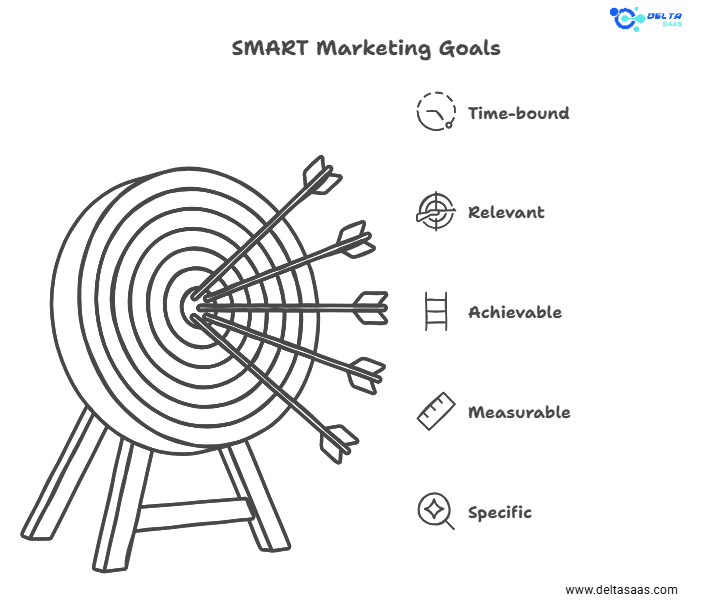
Which Marketing Strategy Is Most Effective?
Choosing the most effective marketing strategy is crucial for business growth. With many options available, including email marketing, SEO, social media, and content marketing, knowing what works best for your industry, audience, and budget can make all the difference. In this guide, we’ll explore various marketing strategies, their benefits, and how to decide which is most effective for your business.
Understand Your Target Market and Goals
Before exploring specific strategies, defining your target market and setting clear goals are essential. A well-thought-out marketing plan starts with understanding who you are trying to reach and what you want to achieve.

Define Your Target Market
Your target audience determines the channels and strategies you should focus on. Understanding their needs, behaviors, and preferences ensures that your efforts align with what resonates most.
- Demographics: Age, gender, income level, and location.
- Interests: What hobbies or topics do they care about?
- Behavior: How do they shop, search, or engage online?
Example: If you run a software startup targeting small businesses, your ideal audience might be business owners aged 30–50 looking for cost-effective solutions.
If you’re looking for the best software, check out Delta SaaS, which offers discounts and lifetime deals on SaaS products.
Tools to Understand Your Audience:
- Google Analytics: Analyze website traffic and user behavior.
- Social Media Insights: Platforms like Facebook and Instagram provide audience demographics.
- Surveys and Feedback: Ask existing customers about their needs and challenges.

Define Your Marketing Goals
Clear goals help you measure the success of your marketing strategy. Use the SMART framework to ensure goals are:
- Specific: Increase website traffic by 30%.
- Measurable: Gain 500 new leads in 3 months.
- Achievable: Double email subscribers within 6 months.
- Relevant: Focus on goals that directly drive revenue or brand awareness.
- Time-bound: Set deadlines for each milestone.
Your goals will guide which marketing strategy is most effective for your business.
Explore Key Marketing Strategies
The most effective marketing strategy depends on your business type, audience, and resources. Below, we list some of the most popular marketing strategies and when to use them.
Email Marketing: Build Trust and Drive Conversions
Email marketing is one of the most cost-effective strategies for businesses of all sizes. It allows companies to communicate directly with customers, nurture leads, and promote products.
Why Email Marketing Works:
- High ROI: According to HubSpot, email marketing generates $36 for every $1 spent.
- Personalized Marketing: Segmenting your email list ensures recipients get tailored content.
- Automated Campaigns: Tools like Mailchimp or Constant Contact let you send drip campaigns, cart abandonment emails, and follow-ups automatically.
Tips for Success:
- Create engaging subject lines to improve open rates.
- Offer valuable content, such as discounts, free guides, or exclusive updates.
- Regularly clean your email list to remove inactive subscribers.
Use Case: A B2B company could send segmented email campaigns to nurture leads and educate them about its product’s benefits.
Also Read,
Apipheny Reviews: Honest Insights Before You Buy
Bind AI Reviews: Honest Insights Before You Decide
BreezeDoc Reviews: Honest User Insights & Features
Honest Documentero Reviews – Features & honestly User Opinions
First Book AI Reviews: Honest User Feedback & Features
Hedy AI Reviews – Honest User Feedback & Features
Search Engine Optimization (SEO): Increase Visibility
SEO is crucial for driving organic traffic to your website. By optimizing your site for search engines, you can improve rankings and attract potential customers actively searching for your products or services.
Why SEO is Effective:
- Sustainable Results: Unlike PPC, SEO drives long-term traffic without ongoing ad spend.
- Improved User Experience: Optimizing for SEO often improves site speed, mobile responsiveness, and navigation.
- Brand Credibility: Appearing on the first page of Google builds trust and authority.
Key SEO Techniques:
- In your content, meta descriptions, and headers, use target keywords like “which marketing strategy is most effective.”
- Build backlinks from credible websites to improve domain authority.
- Focus on technical SEO, such as improving site speed and fixing broken links.
Use Case: A local fitness center could optimize for “best gym near me” to attract nearby customers searching online.
Social Media Marketing: Champion One Social Channel
Social media is an essential platform for businesses to engage with their audience and promote products. Whether you focus on Instagram, LinkedIn, or TikTok depends on your audience and goals.
Why Social Media Works:
- Broad Reach: Platforms like Facebook and Instagram have billions of active users.
- Visual Storytelling: Share images, videos, and testimonials to humanize your brand.
- Targeted Ads: Social media advertising allows you to reach particular audiences.
Best Practices:
- Choose one or two platforms to focus on rather than spreading yourself too thin.
- Post consistently to build trust and brand recognition.
- Use features like Instagram Stories, polls, and live sessions to increase engagement.
Use Case: A clothing startup could use Instagram for visually appealing product showcases and run influencer campaigns.
Read More: Tips for Engaging Potential Customers Online
Content Marketing: Build Authority
Content marketing involves creating valuable, relevant content to attract and retain your audience. Blogs, videos, infographics, and eBooks are excellent ways to educate and engage potential customers.
Why Content Marketing is Powerful:
- Supports SEO: High-quality content ranks well on search engines.
- Builds Trust: Informative content positions your brand as an industry leader.
- Drives Lead Generation: Use lead magnets like free guides or webinars to capture email addresses.
Tips for Success:
- Focus on evergreen content that remains useful over time.
- Share content across multiple channels, including email and social media.
- Repurpose content—for example, turn a blog post into a YouTube video or podcast.
Use Case: A software company could publish blogs on “how to choose the right CRM” to attract business owners looking for solutions.
Influencer Marketing: Leverage Credibility
Partnering with influencers allows you to reach their audience and gain credibility. This strategy works particularly well for startups, small businesses, and brands targeting younger audiences.
Why Influencer Marketing Works:
- Authentic Recommendations: Influencers build trust with their followers, making their endorsements impactful.
- Increased Reach: Collaborating with influencers exposes your brand to new customers.
- Diverse Formats: Influencers can promote your product through stories, posts, videos, or reviews.
Tips for Success:
- Choose influencers whose audience aligns with your target market.
- Track ROI by monitoring engagement, traffic, or sales from their promotions.
- Negotiate clear deliverables, such as the number of posts or videos.
Use Case: A small business selling eco-friendly products could collaborate with an influencer focused on sustainability.
PPC Advertising: Instant Traffic and Results
Pay-per-click (PPC) advertising allows you to display ads on platforms like Google, Facebook, or Instagram and pay only when users click on them.
Why PPC is Effective:
- Immediate Results: PPC drives instant traffic, unlike SEO, which takes time.
- Precise Targeting: Target users based on demographics, interests, and search intent.
- Budget-Friendly: Set a budget that works for your business size.
Best Practices:
- Use A/B testing to optimize ad creatives and landing pages.
- Focus on high-intent keywords like “Digital Marketing Tips for Small Business Success.”
- Retarget visitors who didn’t convert with display ads or special offers.
Use Case: An eCommerce business could use Google Ads to promote a seasonal sale, driving quick conversions.
Key Takeaways:
- Understand your audience and goals before selecting a strategy.
- Email marketing and SEO are cost-effective and offer long-term benefits.
- Social media, content marketing, and influencer partnerships enhance engagement.
- PPC provides instant results, while content marketing builds authority over time.
Advanced Marketing Strategies for Business Growth
While foundational strategies like email marketing, SEO, and social media are essential, advanced tactics can further accelerate business growth. These strategies cater to specific needs, such as targeting high-value clients, building trust, or scaling outreach—below, we’ll explore account-based marketing, word-of-mouth strategies, and creating a cohesive digital marketing plan.
Account-Based Marketing (ABM): Target High-Value Clients
Account-based marketing targets a specific set of high-value accounts rather than casting a wide net. This strategy works exceptionally well for B2B businesses looking to build relationships with key decision-makers.
Why ABM is Effective:
- Personalized Approach: ABM tailors marketing efforts to the unique needs of each account.
- Higher ROI: You maximize resource efficiency by targeting fewer high-value accounts.
- Stronger Relationships: Focusing on specific accounts allows for meaningful, long-term partnerships.
Steps to Implement ABM:
- Define Target Accounts: Identify key clients based on revenue potential, industry, or fit.
- Research Accounts: Understand their goals, pain points, and decision-making processes.
- Customize Campaigns: Use personalized emails, LinkedIn outreach, and targeted ads for each account.
- Collaborate with Sales Teams: Align marketing efforts with the sales team to close deals faster.
Use Case: A software company targeting enterprise clients can create customized webinars or case studies addressing their unique challenges.
Read More: Strong Building Customer Relationships for Success
Word-of-Mouth Marketing: Build Trust Organically
Word-of-mouth marketing is one of the oldest and most effective business growth methods. Happy customers share their experiences, bringing in new leads at no cost.
Why Word-of-Mouth Works:
- Builds Trust: Recommendations from friends and family are more credible than ads.
- Cost-Effective: Requires little to no investment.
- Drives Conversions: Customers referred by others are more likely to convert.
How to Encourage Word-of-Mouth:
- Deliver Exceptional Service: Provide a memorable experience that customers want to share.
- Ask for Referrals: Offer discounts or rewards to customers who refer others.
- Encourage Reviews: Ask satisfied customers to leave testimonials on Google, Yelp, or social media.
Use Case: A fitness studio could incentivize current members to refer friends by offering free classes or discounts.
Conversational Marketing: Engage in Real-Time
Conversational marketing leverages chatbots, live chat, and messaging apps to connect with customers in real time. This approach makes communication more personal and responsive.
Why Conversational Marketing is Effective:
- Immediate Engagement: Customers receive instant answers to their questions.
- Builds Relationships: Real-time interactions create a sense of connection.
- Increases Conversions: Guiding customers through the buying process reduces friction.
Tools for Conversational Marketing:
- Chatbots: Automate FAQs and product recommendations using tools like Drift or Tidio.
- Live Chat: Add a live chat option to your website to assist customers in real-time.
- Messaging Apps: Use WhatsApp Business or Facebook Messenger to stay connected.
Use Case: An eCommerce site selling beauty products can use chatbots to recommend items based on customer preferences.
Affiliate Marketing: Scale Your Outreach
Affiliate marketing allows other individuals or businesses (affiliates) to promote your products in exchange for a commission. This strategy expands your reach without upfront advertising costs.
Why Affiliate Marketing is Valuable:
- Low Risk: You only pay commissions when sales are made.
- Expand Audience: Affiliates bring new customers to your brand.
- Scalable: The more affiliates you work with, the greater your reach.
How to Start Affiliate Marketing:
- Set Up an Affiliate Program: Use platforms like ShareASale, CJ Affiliate, or your custom program.
- Choose Affiliates Wisely: Partner with affiliates who align with your brand and target audience.
- Provide Marketing Resources: Give affiliates banners, links, and promotional materials to make their job easier.
Use Case: A SaaS startup could partner with bloggers and YouTubers to promote their software.
Brand Storytelling: Create Emotional Connections
Storytelling allows you to connect with customers emotionally, making your brand memorable and relatable. It’s about sharing the “why” behind your business.
Why Brand Storytelling Works:
- Builds Trust: A genuine story resonates with customers.
- Humanizes Your Brand: People connect with stories, not just products.
- Increases Engagement: Emotional connections encourage loyalty and repeat business.
Tips for Effective Storytelling:
- Highlight your journey as a startup or small business.
- Share stories of employees, customers, or challenges you’ve overcome.
- Use video storytelling on platforms like Instagram Reels or YouTube.
Use Case: A local coffee roastery could share its founder’s story and commitment to ethical sourcing through video content.
Read More: Tips for Boosting Online Sales Effectively
Steps to Create an Effective Digital Marketing Plan
Combining various strategies into a cohesive plan ensures maximum impact. Follow these steps to develop an effective digital marketing strategy:
- Define Your Goals: Identify what you want to achieve (e.g., more leads, higher sales, improved brand awareness).
- Set a Budget: Allocate resources for ads, tools, and campaigns.
- Choose Marketing Channels: Focus on channels that align with your audience, such as SEO, email marketing, or social media.
- Create a Content Calendar: In advance, plan blog posts, social media updates, and email campaigns.
- Measure Results: To refine your approach, track website traffic, open rates, and ROI metrics.
A clear plan helps you focus your efforts, measure performance, and adjust strategies.
Key Takeaways:
- Advanced strategies like ABM, word-of-mouth, and conversational marketing offer tailored approaches for different goals.
- Affiliate marketing and brand storytelling can expand your reach and build emotional connections.
- Combining foundational and advanced strategies into a cohesive plan ensures long-term success.
Read more: Best Ways to Increase Traffic to Your Website with Proven Methods
Conclusion
So, which marketing strategy is most effective? The answer depends on your business type, audience, and objectives. Combining SEO, content marketing, and email marketing offers excellent results for businesses seeking long-term growth. Startups or small businesses benefit from cost-effective methods like social media or word-of-mouth marketing.
Ultimately, the key is to define your goals, understand your audience, and measure your results to refine your efforts. By leveraging a mix of strategies and tailoring them to your unique needs, you can drive consistent growth and stand out in today’s competitive market.
Start implementing these proven tactics today, and watch your business thrive!
FAQs: Which Marketing Strategy Is Most Effective?
Here are the most common questions about effective marketing strategies and detailed answers to help you choose the best approach for your business.
What is the most effective marketing strategy, and why?
The most effective strategy depends on your goals, target audience, and budget. Content marketing and SEO deliver long-term business results by driving organic traffic and establishing authority. Similarly, email marketing is highly effective for nurturing leads and converting customers due to its high ROI.
Which type of marketing is most effective for small businesses?
For small businesses, cost-effective strategies like:
- Social Media Marketing: Platforms like Facebook and Instagram are free to use and highly effective for building brand awareness.
- Email Marketing: Offers high ROI with minimal investment.
- SEO: Helps drive free, organic traffic over time.
These methods work well for limited budgets while building trust and visibility.
What are the four core marketing strategies?
The four core strategies are often referred to as the 4 Ps of Marketing:
- Product: The item or service you’re offering.
- Price: The value you assign to your product.
- Place: Where your product is sold (online, retail, etc.).
- Promotion: How you promote it (advertising, digital campaigns, etc.).
By balancing these elements, you create a comprehensive marketing approach.
What is the best marketing strategy for lead generation?
The most effective lead-generation strategies include the following:
- Content Marketing: Use blogs, eBooks, and webinars to attract leads.
- PPC Advertising: Target high-intent keywords to capture ready-to-buy leads.
- Social Media Ads: Platforms like LinkedIn and Facebook offer precise targeting for lead generation.
- Email Marketing: Use lead magnets like free guides or tools to collect email addresses.
How can I build trust with my target audience?
Building trust requires consistency, authenticity, and transparency. Key tactics include:
- Brand Storytelling: Share your journey and values to connect emotionally with your audience.
- Social Proof: Display testimonials, reviews, and case studies prominently.
- Responsive Support: Be available to answer questions through live chat or social media.
What are the seven types of marketing strategies?
The seven common strategies include:
- Content Marketing: Creating valuable content to educate and engage.
- Email Marketing: Sending personalized emails to nurture leads.
- Social Media Marketing: Promoting your brand on platforms like Instagram and Facebook.
- SEO: Optimizing your site for better visibility on search engines.
- Influencer Marketing: Collaborating with influencers to boost credibility.
- Affiliate Marketing: Partnering with affiliates to expand your reach.
- PPC Advertising: Paying for ads on search engines or social platforms.
Which marketing strategy is best for startups?
Startups often benefit from strategies that are both low-cost and high-impact:
- Social Media: Build awareness and community without large budgets.
- Content Marketing: Publish blogs or videos that educate and attract early adopters.
- Email Marketing: Use drip campaigns to nurture potential customers.
- Word-of-Mouth: Deliver exceptional service to encourage referrals.
How do I define my target audience?
To define your audience:
- Analyze your existing customers using tools like Google Analytics or CRM data.
- Identify demographics (age, location, income) and psychographics (interests, values, pain points).
- Segment your audience into groups for tailored campaigns.
Understanding your audience ensures your marketing message resonates with their needs.
What are examples of effective content marketing?
Content marketing examples include:
- How-to Blog Posts: E.g., “10 Ways to Grow Your Business.”
- Video Tutorials: E.g., a skincare brand showing how to use its products.
- Case Studies: Highlighting customer success stories.
- Infographics: Summarizing complex data visually.
By providing valuable content, you attract and retain customers while building authority.
What is the best way to create an effective digital marketing plan?
Follow these steps to create an effective plan:
- Define your goals (e.g., lead generation, brand awareness).
- Understand your target audience’s preferences and habits.
- Choose marketing channels like email, social media, and PPC.
- Allocate a budget and set measurable KPIs (e.g., traffic growth or sales).
- Track performance and refine your strategy regularly.
A clear plan helps maximize ROI and align your efforts with business goals.


